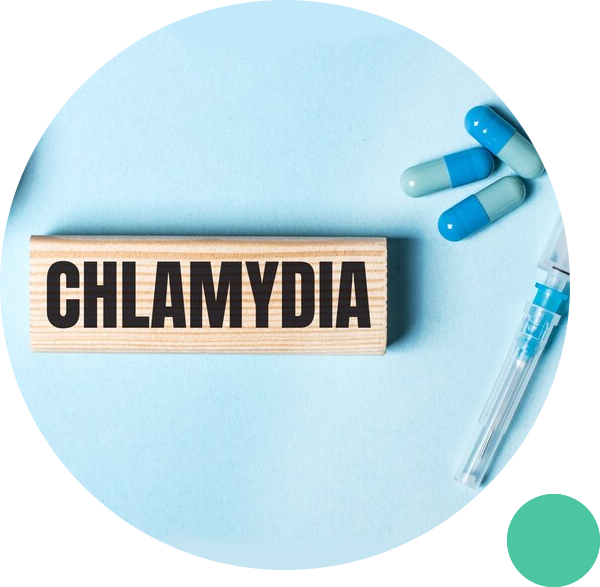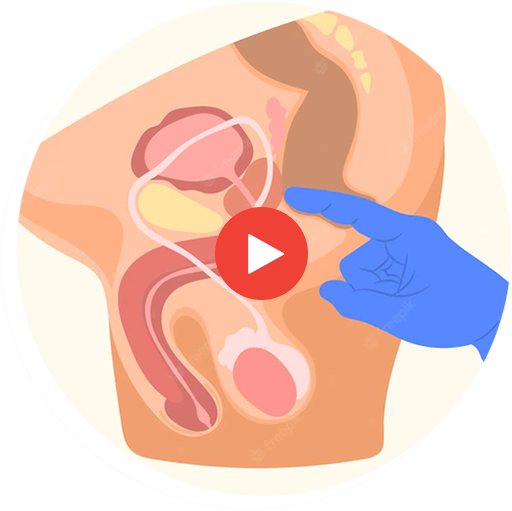
Consult an Online Doctor
For Chlamydia
and Gonorrhea
For those who smoke, it’s important to know that it’s not too late to quit! However, with help from your doctor, you can kick the habit once and for all.
Book an Appointment for Only

It can cause you to experience burning during urination, lower back pain, and bleeding between periods. Most cases of chlamydia do no severe damage to your health; however, it is important to get chlamydia treatment online if you want to prevent future problems.
TELMDCARE
What is
Chlamydia?
With more than half a million cases of sexually transmitted infections (STIs) reported yearly,
we're all too familiar with the consequences of contracting a sexually transmitted disease like
chlamydia.
Chlamydia is a very common STI that's caused by a single-celled bacteria, Chlamydia trachomatis,
which causes an inflammatory reaction in the reproductive tract affecting the urethra, rectum,
and cervix. According to the CDC, over one million new cases of chlamydia are reported each year
in the United States, and about 80 percent of them are among young people ages 15 – 24. It can
be easily passed from person to person through direct contact with a partner's genital or oral
areas. That could include unprotected oral or vaginal sex or close kissing.
TELMDCARE
What is Gonorrhea?
Gonorrhea is a common sexually transmitted disease (STD) that can cause pain during urination, discharge from the penis, and burning when you urinate. It's also called "the clap" because of its characteristic shape. The infection is caused by a bacterium called Neisseria gonorrhoeae. The bacterium enters your body through:
You can spread gonorrhea sexually even if you don't have symptoms and aren't feeling sick. You're more likely to spread it when you:
Primary gonorrhea is most common and usually affects people who have not had sex before or have had sex with only one partner. Secondary gonorrhea develops when an infection spreads from a person infected with another STD, such as chlamydia or syphilis, to the genitals or rectum.
TELMDCARE
Is covered by many popular
insurance plans

Symptoms Of
Chlamydia/Gonorrhea
The symptoms of chlamydia are often very mild and may not be noticeable at all. They, however, may include:
- Fever, sometimes with a headache or back pain
- Pain in your rectum or urethra
- Discharge from your penis or vagina that is yellowish brown or greenish
- Sore throat
- A persistent cough
- Burning during or after urination and during sex
- A persistent desire to urinate
- A swollen testicle or scrotum
- Sharp pain in the lower abdomen
- Soreness or itching in your genitals or anus
- Fatigue
When Should You Seek
Professional Medical Help?
If you notice any symptoms of chlamydia, it’s important to get medical care from a reliable online doctor for chlamydia immediately.
How Can Gonorrhea
Be Treated?
The best treatment for gonorrhea is to avoid getting it in the first place.

TELMEDCARE
What we treat
We treat a variety of acute and chronic conditions and provide expert medical advice and guidance for our patients.
Read More
TELMDCARE
What Should I Do If I
Have Chlamydia?
1. Get tested. This is especially important if your partner has chlamydia
If you have chlamydia, tell your doctor about all the symptoms you're experiencing so they can be sure they're related to chlamydia. Your doctor also needs to know about any other sexually transmitted diseases or illnesses that your sex partner has. This is especially important if your partner has symptoms such as burning when urinating or pain in their testicles (referred to as epididymitis).
2. If you're pregnant or planning to have kids
If you're pregnant and have chlamydia, you may pass the disease to your baby and risk their life. Hence, if you're pregnant and have symptoms of chlamydia, get tested for the condition. Your doctor may prescribe antibiotics right away so that they can begin killing bacteria while they are still in their early stages of growth. Make sure that all the medication is taken exactly as your online doctor prescribes, and follow up with them regularly until all symptoms clear up completely.

3. If you have chlamydia in your eye
In rare cases, chlamydia can cause inflammation in your eye, called conjunctivitis (pink eye). The infection spreads from your eye through your tear ducts into your nose or sinuses. Symptoms may include redness and swelling of the eyelid, eyes that itch, excessive tearing, discharge from the affected eye(s), and pain when blinking or rubbing the eye(s). Treatment for chlamydial conjunctivitis includes antibiotics taken by mouth, eye drops, or an ointment applied directly to the eye for several weeks (usually five to seven days). If your symptoms don't improve after two weeks of taking these medications, you should see your online doctor for chlamydia again to make sure nothing else is causing your symptoms.
4. If you have chlamydia in your throat
Since chlamydia is a bacterial infection, it can be passed from one person to another during vaginal, anal, or oral sex. It's also transmitted through contact with infected body fluids (like blood, semen, or saliva) and contaminated hands. If you have chlamydia in your throat, you may notice a burning or irritating feeling when you swallow and cough. You may also cough up mucus that looks like phlegm (mucus) and has a mild foul odor. A sore throat and fever can accompany this. If you notice any symptoms of chlamydia — such as discharge from your penis or vagina, burning when urinating, or pain when touching your testicles — it's important to get chlamydia treatment online before it becomes more severe.





